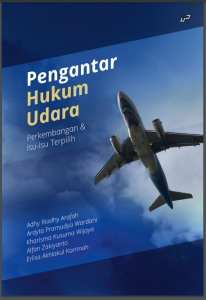 INTRODUCTION TO PRIVATE AVIATION LAW (PENGANTAR HUKUM PENERBANGAN PRIVAT)
INTRODUCTION TO PRIVATE AVIATION LAW (PENGANTAR HUKUM PENERBANGAN PRIVAT)
Book Description
Authors: Adhy Riadhy Arafah, S.H., LL.M (Adv.), Sarah Amalia Nursani, S.H.
Publisher : Prenada Media Kencana Division, 2019
The Montreal Convention of 1999 was established in response to the growing demands of international aviation, marking a significant advancement in the regulatory framework of the aviation sector. This convention not only updates compensation and jurisdiction regulations from previous agreements but also achieves a level of legal unification that had previously been elusive. As of 2018, a total of 131 countries have ratified the convention.
Indonesia joined the ranks of participating countries in 2016 through Presidential Regulation Number 95 of that year. However, the implementation of the Convention has revealed several legal conflicts between its stipulations and Indonesia’s existing national aviation regulations, which were formulated prior to the country’s accession to the Convention. This discrepancy has raised important issues regarding compliance and legal interpretation. The book under discussion aims to address these conflicts by providing insights into the interpretation of the 1999 Montreal Convention and the implications of its implementation within Indonesia. It includes case studies and specific interpretations of the Convention in the Indonesian context to enhance reader comprehension of its provisions.
The author hopes that this book will serve as a valuable reference for the Indonesian government as it works on revising the Aviation Law to align with the internationally ratified standards. Additionally, the book aspires to contribute significantly to the field of Aviation Law/Air Law, benefiting industry stakeholders, educators, students, practitioners, and anyone interested in the evolution of aviation regulations.
 INTRODUCTION TO AIR LAW: Development and Selected Issues / (PENGANTAR HUKUM UDARA (Perkembangan & Isu-isu Terpilih)
INTRODUCTION TO AIR LAW: Development and Selected Issues / (PENGANTAR HUKUM UDARA (Perkembangan & Isu-isu Terpilih)
Authors: Adhy Riadhy Arafah, Ardyta Pramudya Wardani, Kharisma Kusuma Wijaya, Alfan Zakiyanto, Erlisa Akhlakul Karimah.
Publisher: Airlangga University Press, 2022.
Link: https://play.google.com/books/reader?id=nd-lEAAAQBAJ&pg=GBS.PP1&hl=en
The book entitled Introduction to Air Law (Development and Selected Issues) is a series of writings by the author who has a special interest in the development of Air Law.
This book provides an overview of Air Law both publicly and privately with selected issues that have been of public concern in recent times. On public issues, this book raises the issue of the signing of the delegation of navigation management over the Riau and Natuna Islands from Indonesia to Singapore. In addition, this book also reviews technological developments in the airspace, drones and the inherent legal impact on drone operational activities. Aviation crimes that often occur are also a concern in the discussion in this book, one of which is the act of unruly passengers, aircraft hijacking, and sabotage.
In the civil field, this book reviews the business model of cooperation between airline companies such as code sharing, as well as issues regarding aircraft leasing and its legal consequences are also discussed in the civil chapter. So that the issues in this book can be used as a source of reading for air law observers, students, policy makers, lawyers, judges, and others, apart from the fact that this book is also equipped with a translation of the 1944 Chicago Convention.
The text offers a thorough overview of both public and private aspects of Air Law, addressing urgent issues currently garnering public attention. Among the public concerns discussed is the delegation of navigation management over the Riau and Natuna Islands from Indonesia to Singapore. The book also examines technological advancements in the aerospace industry, particularly focusing on drone usage and the associated legal implications of their operational activities. Key issues related to aviation crimes, such as unruly passenger behavior, aircraft hijacking, and sabotage, are also explored in depth. On the civil side, the book reviews cooperative business models between airline companies, including code sharing agreements, along with the legal ramifications of aircraft leasing. The discussions are designed to serve as a valuable resource for a wide range of audiences, including air law specialists, students, policymakers, lawyers, judges, and anyone interested in the field. Additionally, the book includes a translation of the 1944 Chicago Convention, enhancing its utility as a reference work.
